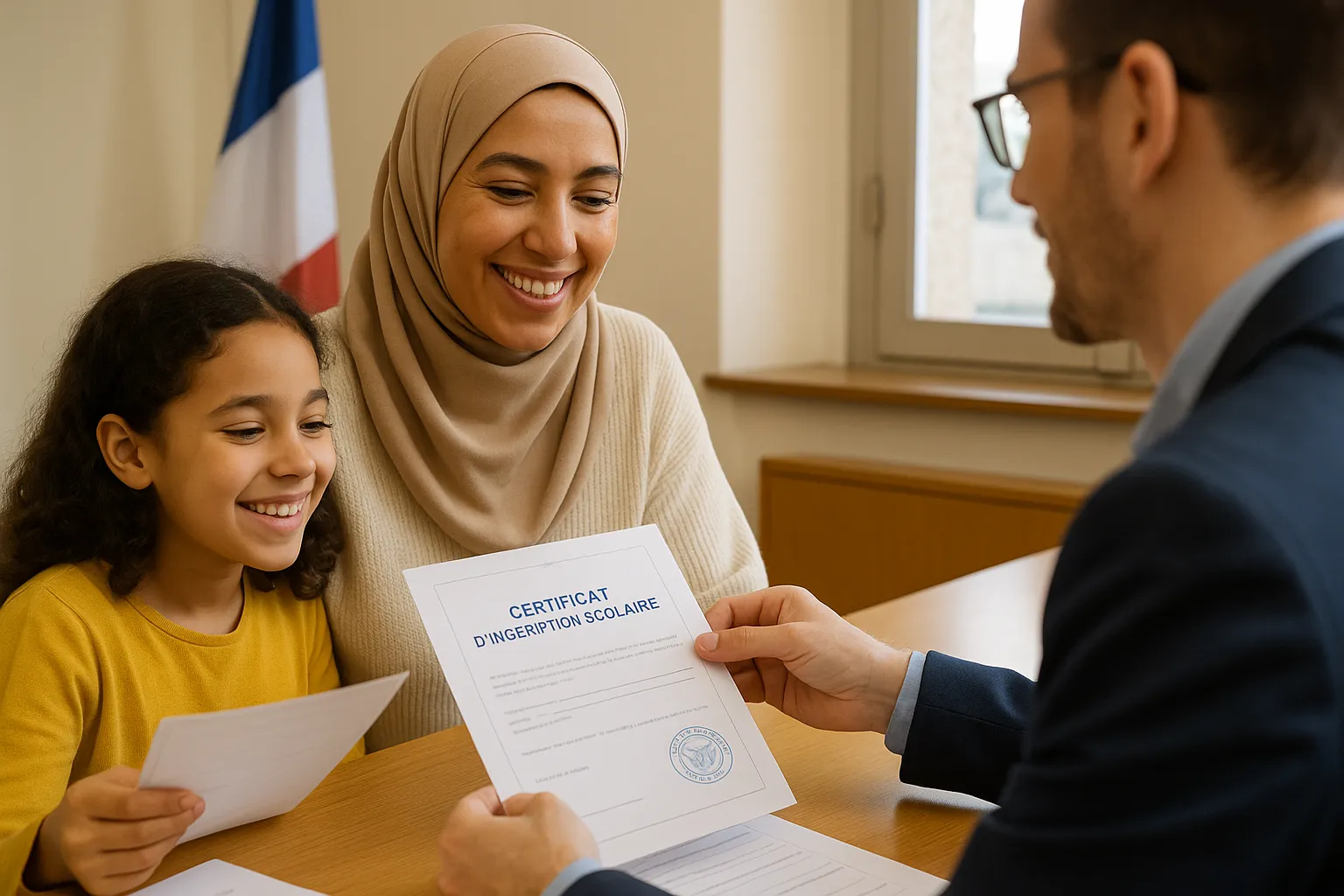Child Enrollment in French Schools Without Legal Status: Parent Guide

School in France Is a Right – Even If Parents Are Undocumented
Under French law, every child aged 3 to 16 has the absolute right to attend public school, regardless of nationality or the parents’ immigration status. This principle flows from three converging texts:
- Article L111-1 of the Code de l’éducation, which guarantees access to education for all children on French soil.
- The 1989 United Nations Convention on the Rights of the Child, ratified by France.
- Circular 2012-141 of 2 October 2012 (Ministère de l’Éducation nationale) instructing mayors and school heads to enroll children even when families cannot present standard residence documents.
Knowing these references is your first shield if a mairie employee or school director hesitates. Print them, highlight the key passages and take them with you on enrollment day.
The Actors You Will Deal With
- Mairie (town hall) – handles enrollment for preschool (maternelle) and elementary (élémentaire).
- Rectorat / DSDEN – the local education authority that assigns children to middle and high school and adjudicates disputes.
- CASNAV – specialised academic centres that test newly arrived pupils and arrange French-as-a-second-language classes (UPE2A).
Understanding who does what helps you escalate the file politely but firmly if the front desk blocks you.
Document Checklist When You Have No Residence Permit
The Education Code allows alternative proofs when standard papers are missing. Bring as many of the following as you can:
| Needed for | Standard document | Accepted alternatives when undocumented |
|---|---|---|
| Child’s identity | Passport or birth certificate | Consular birth attestation, hospital certificate, notarised affidavit translated into French |
| Parent’s identity | Passport or residence card | Passport photocopy even if expired, national ID from home country, sworn statement |
| Proof of address | Recent utility bill or lease | Host attestation with copy of host’s ID + utility bill; hotel receipt; social-service certificate; sworn statement if living informally |
| Immunisation record | Carnet de santé or translated vaccination booklet | Certificate from any physician in France; local PMI clinic record |
If you lack one of these items, ask the mairie for the fiche de renseignements that lets you declare information on honour (déclaration sur l’honneur). Refusal to accept alternative proofs violates Circular 2012-141.
Step-by-Step Enrollment Process
- Visit the mairie’s schooling desk with the above documents. Request a certificat d’inscription. The clerk enters your details into the national database (AFFELNET).
- Take the certificate to the school director listed on the form. She will schedule an appointment to finalise the dossier.
- Health check. For first entry into maternelle or if vaccinations are incomplete, the school doctor or local Protection maternelle et infantile clinic may examine your child. Undocumented status is never transmitted to immigration authorities.
- Receive the livret scolaire – a school booklet that follows the child through the system. Guard it; it will be useful later for prefecture files demonstrating integration.
If the mairie refuses to issue the certificate, go to the rectorat’s “affaires scolaires” service the same day with your written refusal (or note the name and time of the oral refusal). The rectorat can override the mairie and assign a school directly.
What to Do When the Answer Is “No”
Sadly, undocumented families still encounter illegal obstacles: “We need your carte de séjour first” or “Come back when you have a utility bill in your name.” React quickly:
- Quote the law. Show Article L111-1 and Circular 2012-141.
- Request written refusal (refus écrit et motivé). Few clerks are willing to sign an unlawful denial.
- Escalate to the Défenseur des droits via the free hotline 09 69 39 00 00. They can contact the mairie within 48 hours.
- Alert a local NGO (RESF, Ligue des droits de l’Homme) which often accompanies families.
- Gather evidence (emails, dated screenshots) in case you later need to prove discrimination in an appeal or an OQTF defence. Our guide “Lost Prefecture Mail: Reconstructing Proof of Notification” shows techniques that also work here.
School Services Your Child Can Access
- Free French classes (UPE2A) – intensive language support during the first year, organised by CASNAV.
- Canteen and extracurricular subsidies – apply at the mairie’s social desk. Income proof can be payslips, Attestation de versement ADA, or zero-income declaration. Even if you are undocumented, your child can qualify for the lowest meal tariff.
- Scholarship for collège/lycée – the bourse de collège or de lycée is means-tested but independent of immigration status.
- Health insurance – children can be covered by universal medical protection (PUMA). See our article “Medical Coverage in France: Registering with CPAM as a New Visa Holder” for steps; the procedure is nearly identical for minors.
Accessing these services strengthens future residence-permit or naturalisation files by proving integration and stability.
Protecting the Family From Prefecture Risks
School databases do not share data with immigration authorities, but prefectures sometimes request school certificates to verify residence. Keep copies of:
- Certificates of enrollment (certificat de scolarité) each semester
- Canteen invoices and extracurricular bills
- School reports (bulletins)
These documents become powerful evidence if you decide to apply for a carte de séjour “vie privée et familiale” or defend against an OQTF. Read our guide “From Undocumented to Documented: Step-By-Step Regularization Through Employment” to see how integration proof accelerates approval.
Common Myths – Debunked
- “Teachers will report us to the police.” False. Educators are bound by professional secrecy and have no duty to denounce immigration status.
- “My child cannot go on school trips without a passport.” Schools can accept any photo ID or even a sworn parental statement for domestic trips.
- “Middle school is optional for undocumented kids.” Article L131-1 makes education compulsory up to 16 for all children.
How ImmiFrance Can Help
Navigating enrollment is only the first step: securing long-term stability often means addressing your own immigration situation. ImmiFrance offers:
- Case diagnostic – a 30-minute phone review to map the best regularisation route.
- Prefecture appointment monitoring – we track slots in real time and book them for you, avoiding the multimonth waits many parents face.
- Dossier compilation – personalised checklists so your school certificates, payslips or tax returns tell a coherent integration story.
- Lawyer referrals – rapid connections to child-rights and immigration specialists if you encounter unlawful refusals or an OQTF.
Book a confidential consultation at immifrance.com or call +33 1 86 65 25 42 to secure your child’s place and your family’s future.

Key Takeaways
- French law guarantees schooling from age 3 to 16, regardless of parents’ immigration status.
- Alternative proofs of identity and address are explicitly allowed; a mairie cannot demand a residence permit.
- If refused, insist on written justification, escalate to the rectorat and contact the Défenseur des droits.
- Keep school documents; they are gold for future residence-permit or OQTF files.
- ImmiFrance stands ready to transform school-enrollment success into full legal security for your family.
